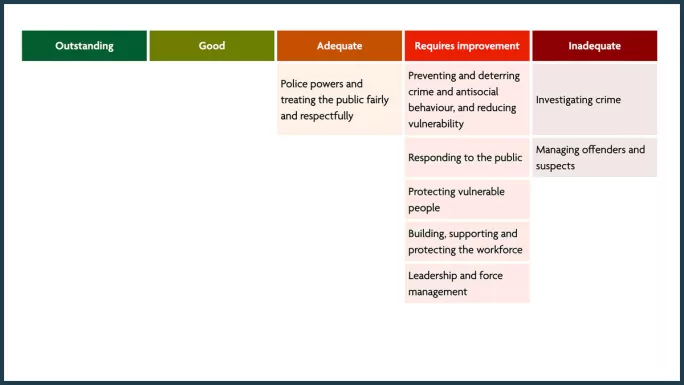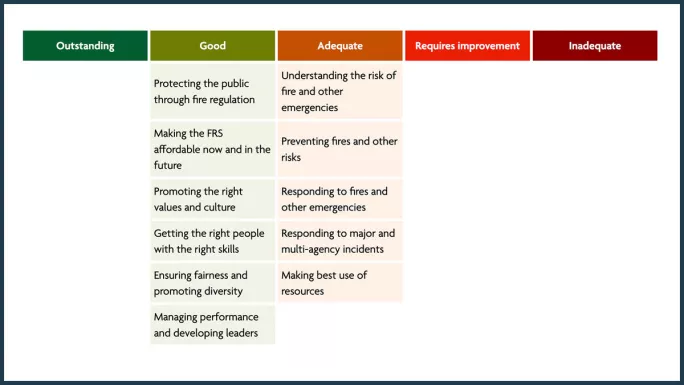Ofsted report cards: could police and fire systems point the way?

This week, the Department for Education announced that it has scrapped Ofsted single-word inspection judgements with immediate effect and will introduce a new report card system in September 2025.
But while the idea of a report card system has long been expected - Labour pledged to introduce it in its election manifesto - we do not yet know exactly how it will look, with the DfE and Ofsted promising to consult with the sector to determine the model for the new system soon.
As part of this work, they may well look at accountability systems in other parts of the public sector - specifically the police and fire services, which use a model more akin to a report card. So how do these work - and do they offer clues as to what new school inspections may look like?
Police and fire inspections
Since 2014, the 43 police forces in England and Wales have been assessed by His Majesty’s Inspectorate of Constabulary and Fire & Rescue Services (HMICFRS) according to the police efficiency, effectiveness and legitimacy (PEEL) criteria.
Former home secretary Theresa May said at the time that the introduction of PEEL assessments represented a “radical shift in how police forces are held to account” by allowing people to see how they were performing in a raft of key areas.
As an example, the latest PEEL assessment of the Metropolitan Police Service is below:

As you can see, instead of a single-word overall judgement, PEEL criteria are broken down into different elements of police procedure, such as “investigating crime” and “protecting vulnerable people”.
These are then rated in terms familiar to the education sector - “outstanding”, “good”, “adequate”, “requires improvement” and “inadequate”.
The above diagram provides members of the force and the public with a clear sense of whether it is operating well - the lack of any elements of the Met’s work in the “outstanding” or “good” columns is plain to see. The colour coding further adds to this ease of understanding.
Furthermore, on the report page, each element then clicks through to a detailed explanation of why it achieved that rating - such as this explanation of its “inadequate” rating for investigating crime.
Meanwhile, fire and rescue services are also assessed by HMICFRS and use a similar model, evaluating elements that contribute to their effectiveness and efficiency, and how well they look after people.
For example, the most recent judgement for Cheshire Fire and Rescue Service is below:

These assessment systems are not fixed - they change with time. For example, in 2023, the “adequate” category was introduced, which “allows us to state more precisely where we consider improvement is needed and how to achieve it”, HMICFRS says.
This shows that flexibility could also be built into a similar accountability system for schools.
The education view
So what do people in the education sector think about these models?
Speaking to Tes, Ofsted chief inspector Sir Martyn Oliver describes the HMICFRS system for assessment as “a great example…I really like their model”.
In fact, he noted that the HMICFRS office is just downstairs from Ofsted’s London HQ, so perhaps he could pop in to compare notes.
Meanwhile, Pepe Di’Iasio, general secretary of the Association of School and College Leaders, says he has looked at the range of “existing report card-like models being used across education and the public sector” and sees “much that can be learned from their strengths and weaknesses”.
“The government should carefully examine these models,” he adds.
So far, neither the DfE nor Ofsted has formally referenced the police or fire models in their announcements, but it would seem likely they are on their radar as models to emulate.

- Ofsted’s Big Listen response: all you need to know
- DfE scraps Ofsted single-word school inspection grades
- Sir Martyn Oliver: ‘We accept the criticism’
Other ideas for report cards
There are other report-card models in development within education that should be considered, too.
As chair of Camden Learning, Dame Christine Gilbert, whose independent review of Ofsted was published on Tuesday, is working on the development of a new kind of school report card in the London borough (as well as with local authorities in Milton Keynes and Sheffield) that aims to give parents “a fuller picture of the school”.
These cards provide details about a range of school activities - such as the curriculum, student “achievement and destinations” and extra-curricular offerings - to help showcase everything a school does. Ofsted reports are included, too, but this is “just one part of it”, she says.
She argues that schools bringing all this together themselves to present a more holistic picture to parents means they can “involve themselves in the process of accountability without creating more pressure”.
The need for this fuller picture is also why Dame Christine says that she believes whatever Ofsted’s new system looks like, “it is important the new report card isn’t just a data dashboard”.
Jason Elsom, CEO of Parentkind, agrees that parents now want as much information on a school as possible, including those things that are not always easily quantified.
“While school leadership and the quality of teaching are the most important bits of information for parents, how happy children are at the school and mental health support are only just behind,” he says.
“This needs to be recognised when it comes to designing a new report card.”
For now though, exactly what form the new report cards will take remains unclear.
But as this new system is due to be in place in September next year and formal consultations are due to begin in January, it won’t be too long before things start to take shape.
For the latest education news and analysis delivered every weekday morning, sign up for the Tes Daily newsletter
topics in this article



